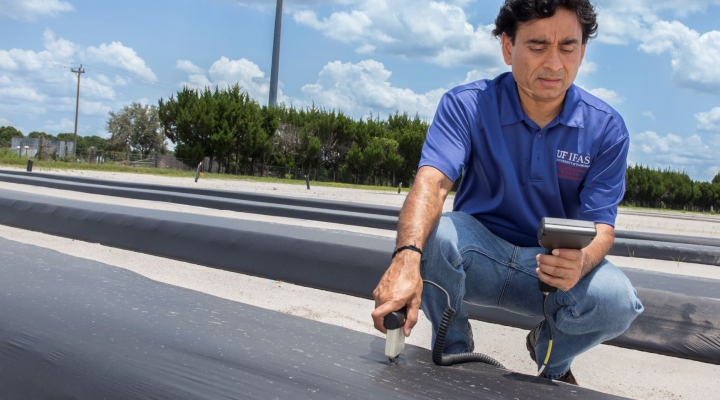Jul 29, 2020UF/IFAS engineer earns national honor for work in micro-irrigation
With his compact-bed geometry design, Sanjay Shukla has helped growers around the world save on water, fertilizer and money.
In Shukla’s design, taller, narrow beds of soil replace shorter, wider ones. Current beds tend to be 3-feet wide and 6-8 inches in height. Shukla developed beds that are 16 to 24 inches wide and 10 to 12 inches high, and they can reduce the need for inputs such as pesticides, plastic and energy by bringing the beds close to the drip-wetted area.
Through these efforts and more, Shukla, a UF/IFAS professor of agricultural and biological engineering, won the Netafim Award for Advancements in Microirrigation from the American Society of Agricultural and Biological Engineers (ASABE).
“I am honored, and I am thankful to my research team and the farmers of Florida and elsewhere, without whom this would not have been possible,” Shukla said of his award.
The idea for the compact-bed design struck Shukla after Hurricane Wilma in October 2005.
“I saw large-scale damage to crops in Florida due to flooding,” Shukla said. “My experience from farms around the globe taught me to think holistically about water. We must create solutions that not only save water and improve its quality, but that also reduce costs and risks such as disease and extreme weather events. The compact-bed design achieves those goals, and therefore increased its chances for farmers to adopt it.”
Shukla’s compact beds are so effective that North America’s largest tomato producer and several other top-10 producers have adopted the designs, said Calvin Arnold, former director of the UF/IFAS Southwest Florida Research and Education Center (SWFREC) in Immokalee, Florida, and one of Shukla’s former supervisors.
Shukla’s work also impresses Elizabeth Malek, the crop protection assistant manager for Lippman Family Farms. In fact, she cited the design when she recommended Shukla for the national award.
“Dr. Shukla’s compact bed geometry design is an exceptional achievement for the vegetable,” she wrote. “Faculty like Dr. Shukla set an example for the scientists that we depend on to continue our profitability and sustainability … This new design has enabled us to figure out how to reduce inputs to produce high-quality fresh produce, improve efficiencies of water, nutrients and pesticide use.”
Because of Shukla’s work, Lippman has begun to adopt compact beds in its operations in Florida, South Carolina and Virginia, Malek said. Three of the Lippman farms are very close to Shukla’s lab at SWFREC in Immokalee, Florida.
The honor recognized Shukla for more than just his compact-bed geometry.
In addition to that design, Shukla has also led projects to quantify water use for drip-irrigated crops to develop irrigation management. Shukla’s research on water and food security in India found a nexus between the free agricultural electricity policy and declining groundwater availability. He developed an alternative policy to use savings from a reduced subsidy to convert flood to drip irrigation for reduced frequency of well drying and increased profits under current and future climate.
“Dr. Shukla’s unique approach to his integrated research and Extension program, his dedication to stakeholder engagement, his academic and on-the-ground accomplishments made him an excellent candidate for the award,” said Wendy Graham, Carl S. Swisher Chair in Water Resources in the UF/IFAS department of agricultural and biological engineering and director of the UF Water Institute.
In his career as a scientist, Shukla has authored 60 peer-reviewed journal publications and 29 UF/IFAS Extension publications that are being used by the agricultural industry. He has also earned several awards, including the 2019 Florida ASABE Distinguished Achievement Award, 2018 UF Research Foundation Professorship; the 2017 Distinguished Fellow of the UF Water Institute, the 2017 UF Term Professorship and the 2017 Wells Fargo Extension Award and the 2015 Award of Excellence for Graduate Research.
Shukla has also “played an active role in the Vegetable Advisory Committee of UF, which is critical to the industry here in southwest Florida,” Malek wrote.
Shukla earned his bachelor’s degree in agricultural engineering from the University of Allahabad in India. Then he earned his master’s degree in agricultural engineering and his doctorate in biological systems engineering – both from Virginia Tech.
He has worked as a faculty member at SWFREC since 2000. For more about Shukla, visit this site.
–Brad Buck, Institute of Food and Agricultural Sciences and University of Florida (UF/IFAS
With his compact-bed geometry design, Sanjay Shukla has helped farmers around the world save on water, fertilizer and money. In Shukla’s design, taller, narrow beds of soil replace shorter, wider ones. Current beds tend to be 3-feet wide and 6-8 inches in height. Shukla developed beds that are 16 to 24 inches wide and 10 to 12 inches high, and they can reduce the need for inputs such as pesticides, plastic and energy by bringing the beds close to the drip-wetted area. Photo: UF/IFAS

















